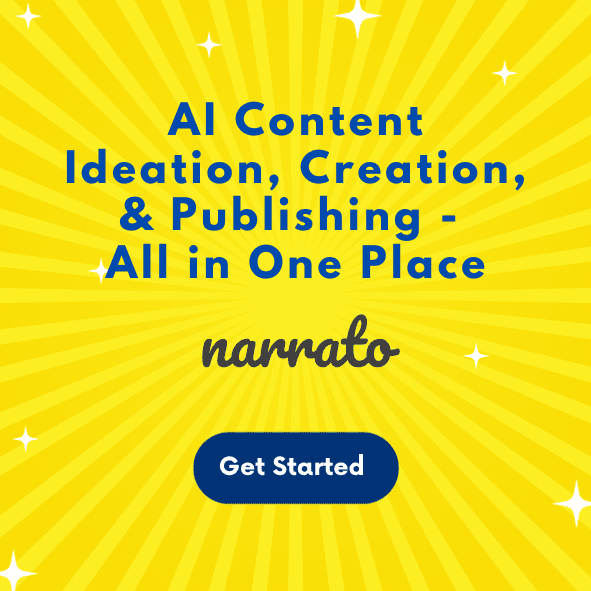Any business that desires a strong online presence should ensure its content is not only visible to search engines but also engaging for its audience. Achieving this can be a challenge, but with ChatGPT, you have the perfect ally. Developed by OpenAI, ChatGPT is an AI-powered language model that has the answer to all your questions. That means it can help with search engine optimization too. The key is to provide the right ChatGPT prompts for SEO. Not sure how to use ChatGPT for SEO content creation? In this article, we’ve compiled a great list of 50+ ChatGPT SEO prompts to enhance your SEO efforts.
Previously, we provided you with ChatGPT prompts for content writing. This time around, our focus is going to be on SEO.
TL;DR Here’s a video with some great ChatGPT prompts for SEO content creation –
The Ultimate List of ChatGPT Prompts for SEO
- ChatGPT prompts for SEO-friendly topic generation
- ChatGPT prompts for SEO content outline
- Keyword research ChatGPT prompts
- Classify audience search intent using ChatGPT prompts
- ChatGPT prompts for SEO blog writing
- ChatGPT prompts for SEO copywriting
- ChatGPT prompts for SEO meta description and meta title creation
- ChatGPT prompts for identifying popular questions for FAQs
- ChatGPT prompts for better readability and ranking
- ChatGPT prompts for SEO content proofreading
Tips and best practices for using ChatGPT prompts for SEO

ChatGPT and SEO
ChatGPT is an advanced large language model developed by OpenAI that can understand, analyze, and respond to conversation cues. This AI tool can address questions, offer recommendations, generate content, and even craft beautiful poetry. With an impressive ability to understand context and deliver coherent responses, ChatGPT can be an invaluable asset for a wide range of applications. Yes, including search engine optimization (SEO).
- It can help you with keyword research.
- It can produce a diverse range of subtopics within a given topic.
- It is capable of strategically incorporating keywords in the content.
- Its ability to create engaging long-form content can help improve dwell time.
- It can do a lot more!
Leveraging this AI tool, you can effectively streamline your SEO efforts, ensuring higher visibility and better search rankings.
Narrato AI offers a similar AI Chat tool, besides 100+ content creation templates and other AI tools for image generation, search engine optimization, topic generation, and more. To generate content at the enterprise level, look at Typeface, an AI SEO content platform that generates posts, articles, and documents containing relevant keywords, meta titles and descriptions, and even a content performance score that helps you better align your content to your audience and brand.

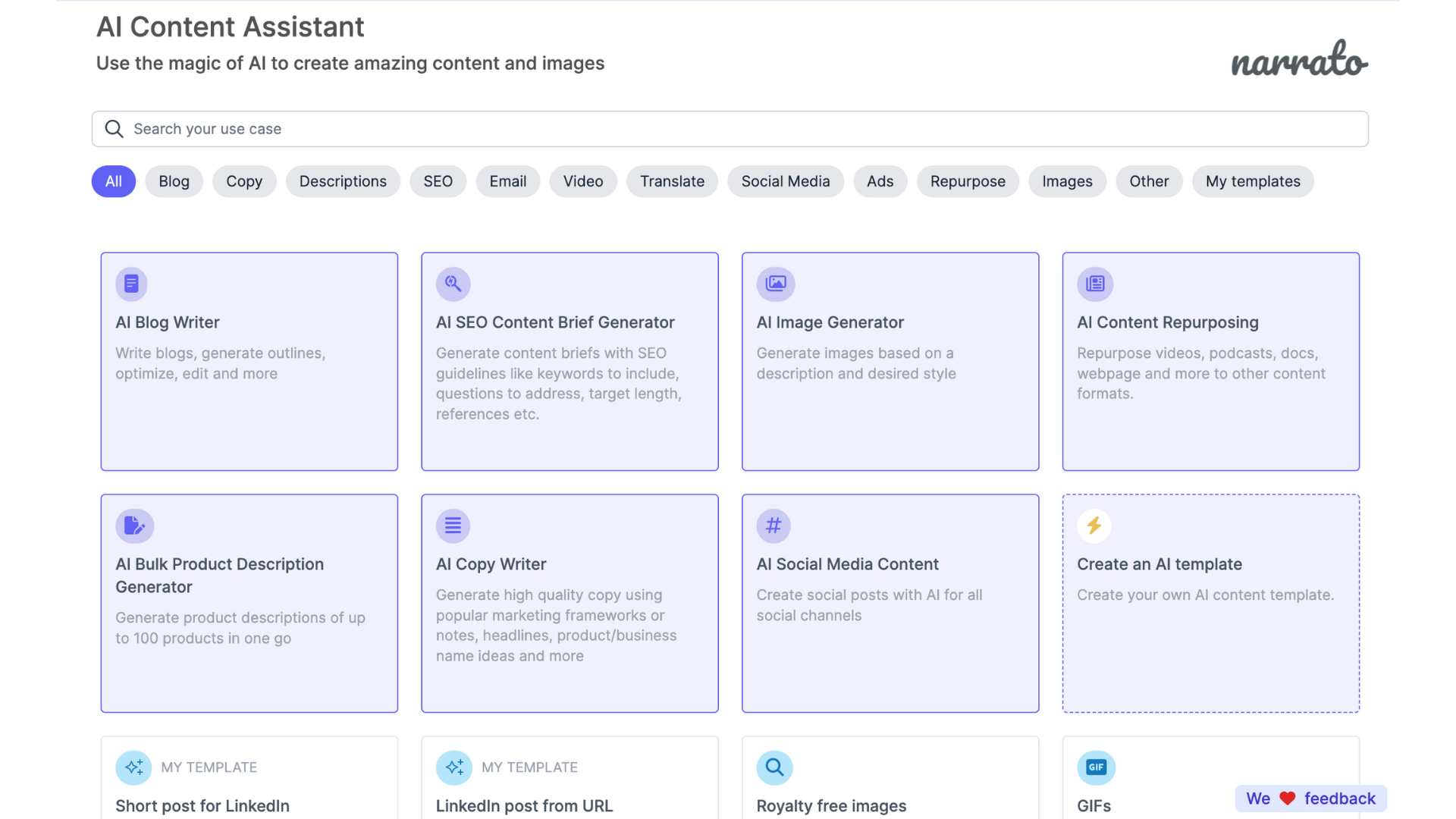
Alright, let’s dive right into the ChatGPT prompts for SEO, shall we?
The Ultimate List of ChatGPT Prompts for SEO
Never run out of ideas to enhance your SEO strategies. Here are some Chat GPT prompts for SEO to help you along the way –
1. ChatGPT prompts for SEO-friendly topic generation
Selecting the right topics is a crucial aspect of creating SEO-friendly content. The following prompts can help you brainstorm potential topics for your niche:
- Generate a list of X SEO-friendly blog post topic ideas for the [industry name]
- Suggest a list of SEO-optimized topics for the keyword [keyword]
- You are an online marketing manager, and you need to create a list of SEO-friendly topic ideas relating to [topic]. For each topic, think about the phrases that the audience might use and expand that list accordingly.
- I’m currently marketing an app [app category] that is specifically designed for [persona]. Can you brainstorm X number of SEO-friendly content ideas for [content type] on [niche], targeting the interests of [specific subset of the persona]?

Additional tools for SEO topic generation
You may want to give Narrato’s AI topic generator a try for SEO topic suggestions. Using it is quite easy. Simply input the broad idea, theme, or keywords for the content piece, and it’ll give you a list of SEO-optimized topic titles to choose from. You can directly add these topics to your project and begin creating your content.
2. ChatGPT prompts for SEO content outline
ChatGPT can also help create an effective content outline, which is an essential part of SEO content writing:
- Create a comprehensive blog post outline for a blog article titled [title], using a 2-level heading structure. Make sure to include the keyword [keyword] in the headings and subheadings.
- Provide an outline of the main points to include in a comprehensive blog post guide about [topic], with the primary keyword [keyword]
- You are an experienced copywriter. Create a detailed, SEO-optimized content outline for the keyword [X]. This outline will specifically target [audience] and will have a [tone of voice] tone. The desired length for the blog post will be [X] words.
- Write X H2 and H3 subheadings for a blog post on the topic [topic]. Make sure the subhead titles are 60 characters max and catchy.
- Here is the topic for a content piece: [Topic]. Explore the topic by providing examples that challenge the widely accepted viewpoint. Create a content outline that encourages readers to question their assumptions.

Additional tools for content outline generation
Narrato AI offers dedicated AI content templates for creating blog post and web page outlines. There’s no prompt engineering required here. All you have to do is provide the tool with the topic and some context, and AI will generate a content outline for you in seconds.
3. Keyword research ChatGPT prompts
Keyword research is a fundamental aspect of any SEO strategy. ChatGPT can be especially handy to help you kickstart your brainstorming process for keywords. Try out these ChatGPT prompts for SEO keywords and see for yourself –
- Find X SEO keywords that are related to [topic]. Follow-up prompt: Now suggest keywords with a high search volume.
- Generate a list of X SEO keywords that are relevant to the product description [product description]
- Generate a list of long-tail, high-volume, low-difficulty keywords related to the topic [topic]
- Create a list of low-competition keywords for [industry] industry
- You are an SEO lead with extensive knowledge of keyword research. Suggest X SEO keywords that perfectly align with the content covered in the [blog post section]
- You are a digital marketing manager with a list of topics [add topic list]. Your job is to think of phrases you believe the audience will use when searching for these topics
- Suggest X best SEO keyword strategies that would be relevant to the topic: [topic]
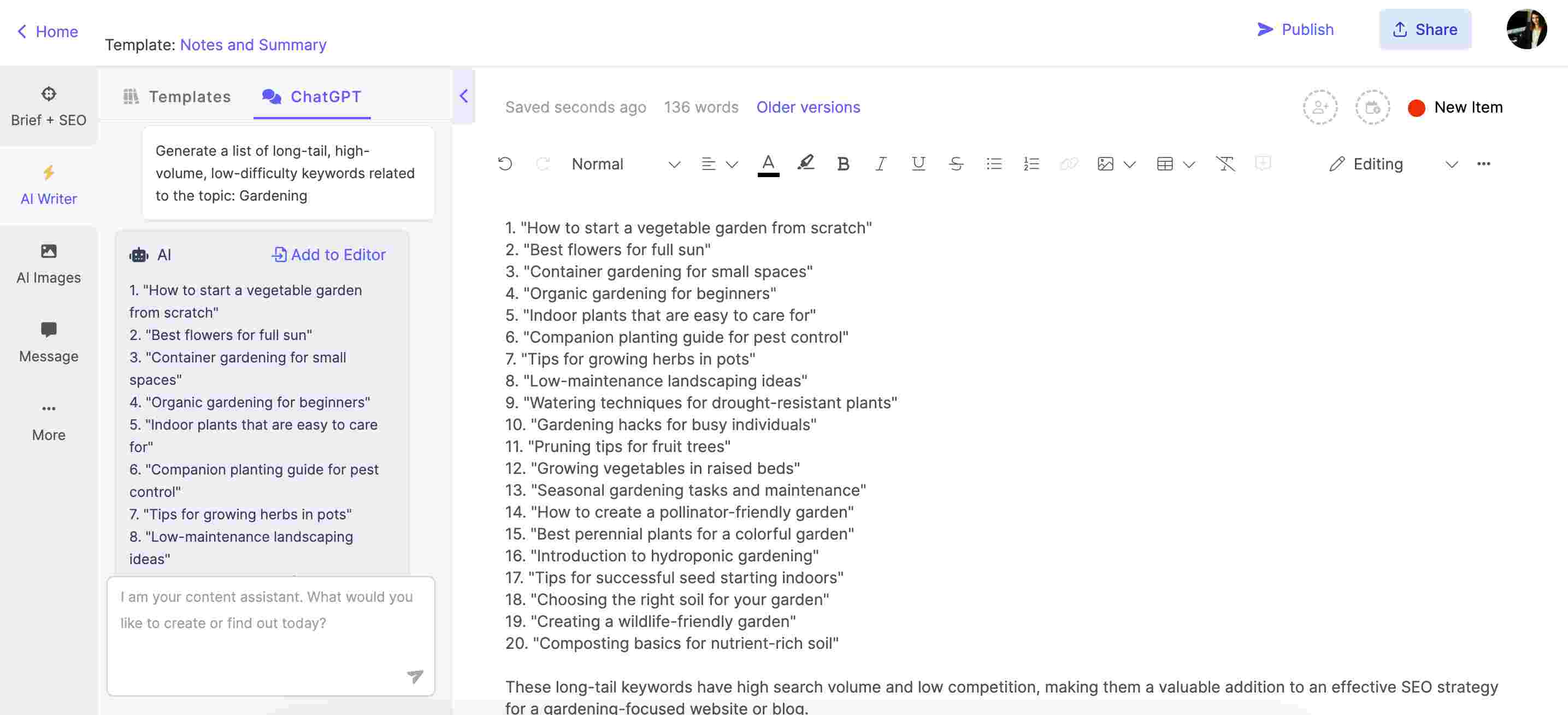
Additional tools for keyword research
Besides ChatGPT, there are many other keyword generators to help you with keyword research. Narrato AI keyword generator, for instance, takes only a few seconds to give you some related keywords for a topic. The platform also offers an SEO tool that generates a complete SEO content brief for a topic, with keyword suggestions, competitor references, and more.
4. Classify audience search intent using ChatGPT prompts
Creating content that matches the target audience’s search intent can boost your ranking on search engines. Here are some ChatGPT prompts to help you with the research and classification of audience search intent:
- What would be the user search intents for the keyword [keyword]
- Classify possible search intents for a website in the [industry/niche]
- Research X keywords for [topic] and organize these keywords based on their search intent (transactional, informational, commercial). Present this information in a table format.
- Can you provide a list of X long-tail keywords related to [topic] and explain their corresponding search intent?
- Here is a list of keywords [Add keyword list]. Classify the search intent for each in a tabular format.
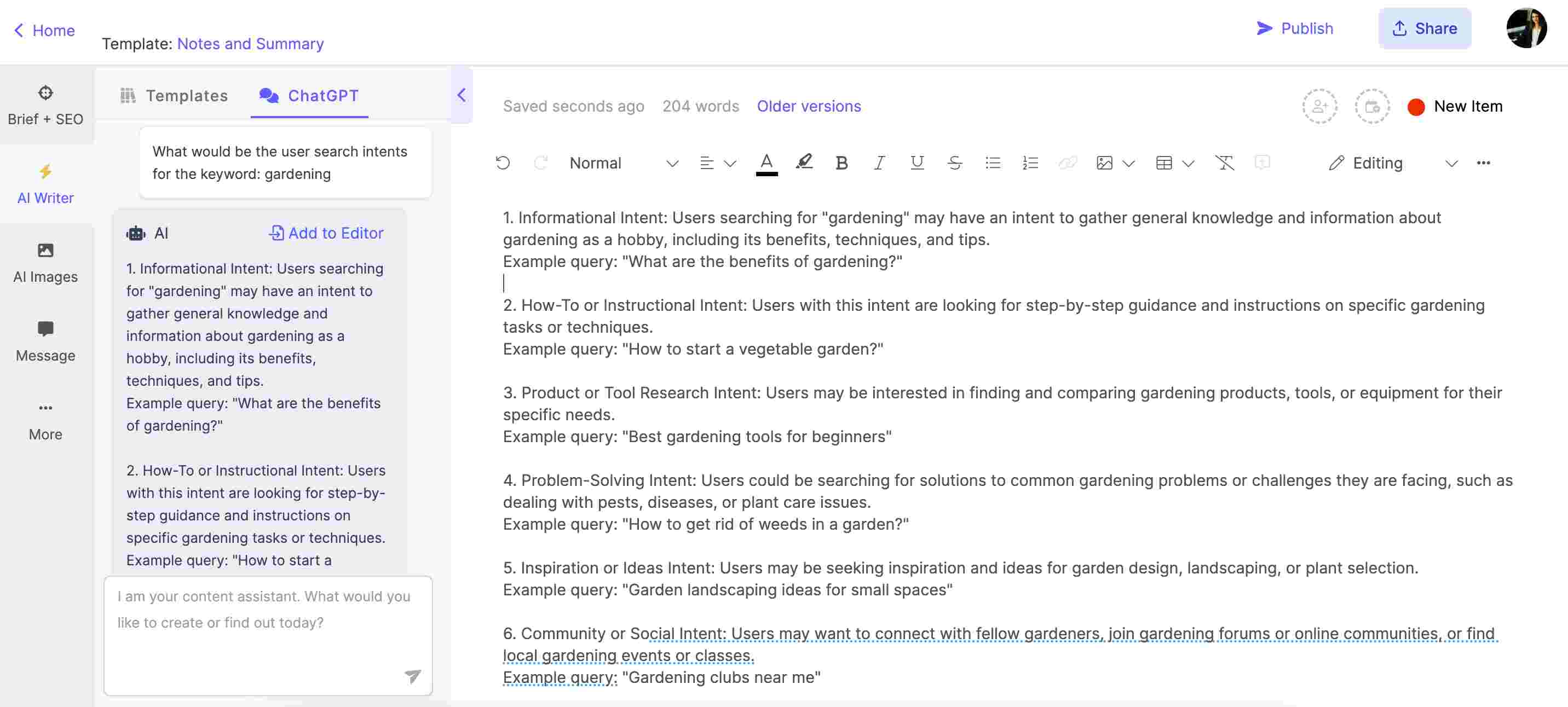
Additional tools for finding search intent
Content Harmony has developed a search intent classification system to provide a swift and comprehensive understanding of various aspects of a Search Engine Results Page SERP for content creators and SEOs. With these reports, you can quickly find answers to critical questions, such as:
- Content Formats: Identify the preferred content formats that Google aims to display in search results.
- Page Types: Understand the types of pages that are currently ranking for the targeted query.
- Intent Modifiers: Pinpoint search intent modifiers and sub-intent factors that demand your attention.
- Freshness Impact: Determine the significance of content freshness on the current SERP.
- Search Trends: Stay informed about the latest search trends associated with the specific query.
5. ChatGPT prompts for SEO blog writing
ChatGPT can be a powerful tool for SEO writing with AI for your blog and other channels. Use these fantastic SEO content writing prompts to boost your blog’s visibility and organic traffic:
- Create a blog post in X words, on the topic [topic] using the primary keyword [keyword] every 500 words. The blog article should have an intro, main body and conclusion. Split the main body into X different subsections.
- Write a listicle blog post in X words on the topic [topic] and optimize for the primary keyword [keyword]. This keyword should appear exactly as it is at least X times in a post, in X subheadings. Create the blog post in HTML format, and make sure to add a table of contents right after the introduction. This table should have links to each item on the list, making it easier for readers to navigate the content.
- Craft a concise and SEO-friendly introduction in X words for your blog post titled [topic title]. Make sure to include the keyword [keyword] and touch upon the key points including [key points you want to include].
- Write a short conclusion in X words for your blog post titled [topic title]. Make sure to write it in [tone] tone and include a CTA for [company], along with a link to [add link].
- [Add blog content] Rewrite this text to include these SEO keywords: [Keyword 1, Keyword 2, Keyword 3…]
You’ll find some more prompts for SEO blog writing in this compilation of ChatGPT prompts for blog content writing, ideation, and SEO.
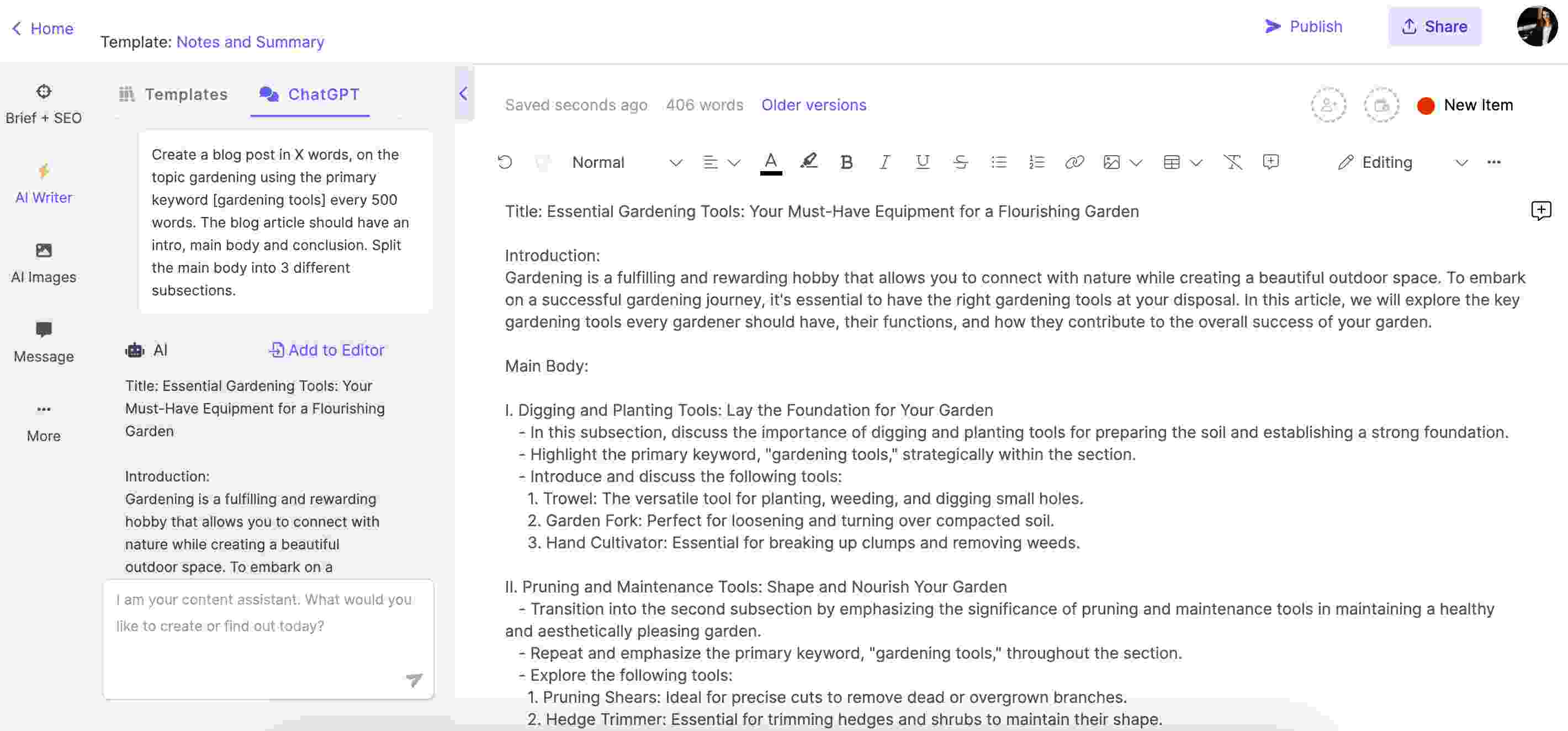
Additional tools for SEO blog writing
Narrato’s AI blog writer can also give you a great first draft to work with. You can create both short-form and long blog articles using the AI templates offered by the AI blog writer. All you have to do is provide a few basic details about the blog, along with the keywords you want to include, and it will generate a complete SEO-optimized blog post in seconds.
There’s also the AI Content Genie on Narrato that creates blog content on autopilot. It doesn’t require any input from the user. Once you feed the tool with your website URL, it will generate relevant, ready-to-publish blog posts for you every week.

6. ChatGPT prompts for SEO copywriting
ChatGPT is an amazing tool that can take your copywriting game to the next level. Here, we’ve compiled a list of ChatGPT prompts for SEO copywriting that will help you create captivating content that ranks higher and drives more organic traffic to your website.
- Create a web page on the topic [topic] for a [company and product details]. Make sure to optimize it for the keywords [Keyword 1, Keyword 2, Keyword 3…]
- Write an X-word USP for a sales page for [company and product details]. Write it for [target audience] who would like [product differentiators], and include the keywords [Keyword 1, Keyword 2, Keyword 3…]
- You are a copy editor with knowledge of SEO. Write a web page copy in X words highlighting the features of [product]. Highlight [product features] and make sure it will be appealing to [target audience]. Use the keyword [keyword] throughout the content.
- Draft a short write-up that influences [target audience] to purchase [product]. Make sure to incorporate the call-to-action: [CTA] and these keywords: [Keyword 1, Keyword 2, Keyword 3…]
- Using the [mention copywriting framework], craft a compelling argument for readers to explore [product] in X words.
- Write an X-word product description for [product] including the keywords [keywords], and highlighting the features [features list]
- Draft a [LinkedIn/Facebook/Google/Instagram] ad aimed at [target audience], promoting [product features]. Make sure to incorporate these keywords: [Keyword 1, Keyword 2, Keyword 3…]
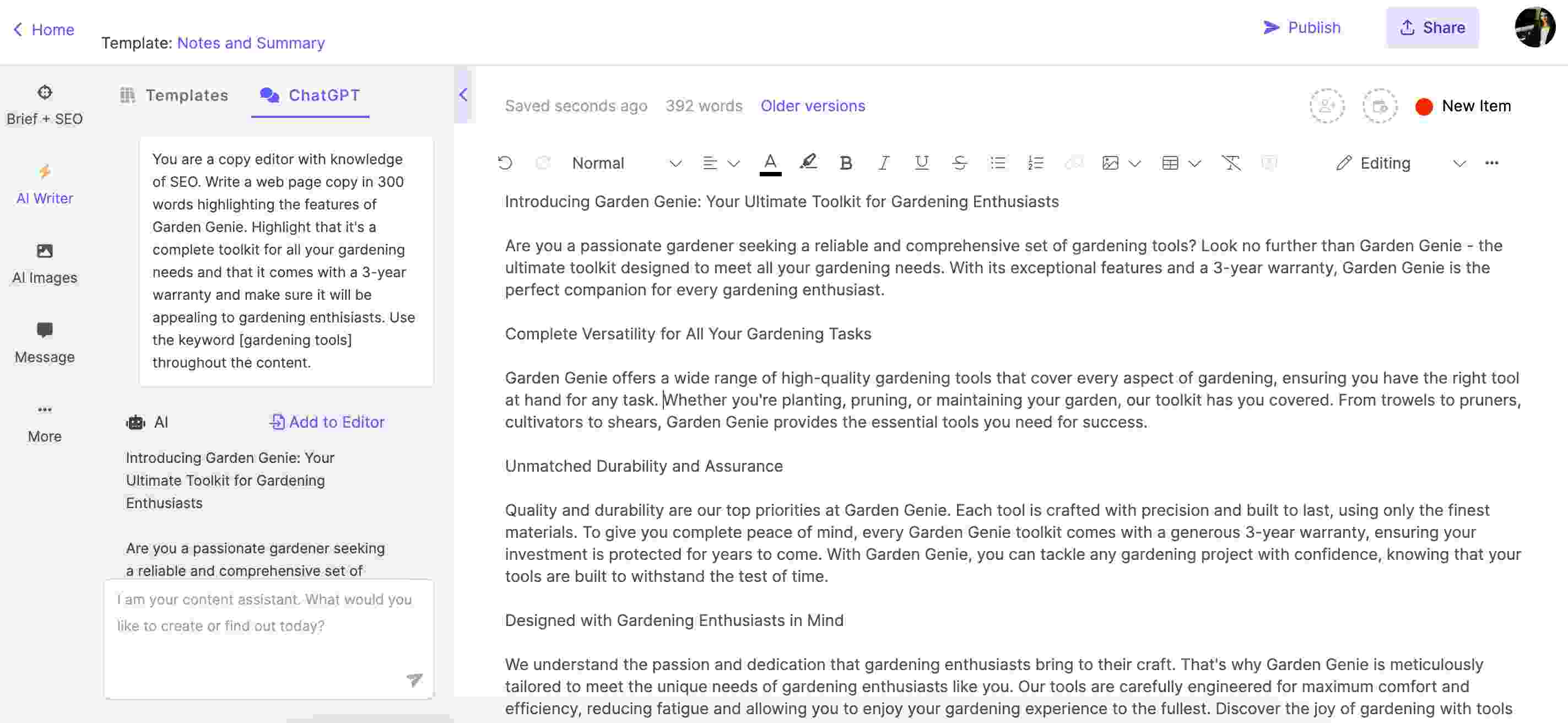
Additional tools for SEO copywriting
To make this job easier, you can try using Narrato’s AI copywriter which has several pre-made AI copywriting templates to help you with every kind of content. You can create web pages, landing pages, brochures, ad copy, and even content using specific copywriting frameworks (AIDA, PAS, BAB). Besides this, Narrato also offers an AI product description generator, that generates product descriptions, single or in bulk.
7. ChatGPT prompts for SEO meta description and meta title creation
Crafting compelling meta titles and descriptions is essential for drawing in readers, and ChatGPT can assist you by generating persuasive and concise descriptions for your content. Here are some ChatGPT prompts to help you get started:
- [Add content] Create a meta description and title for this content, including the keyword [keyword]. Make it easy to read and add a CTA.
- Add X meta titles and descriptions for the topic [topic] and use the keyword [keyword] in a table format.
- Generate a meta title and description that accurately represents our website’s content and includes important keywords. Here are the pages I want you to create the metadata for [give information about web pages]
- Compose a meta description for a blog post incorporating the keyword [keyword], ensuring that the character count does not exceed [X].
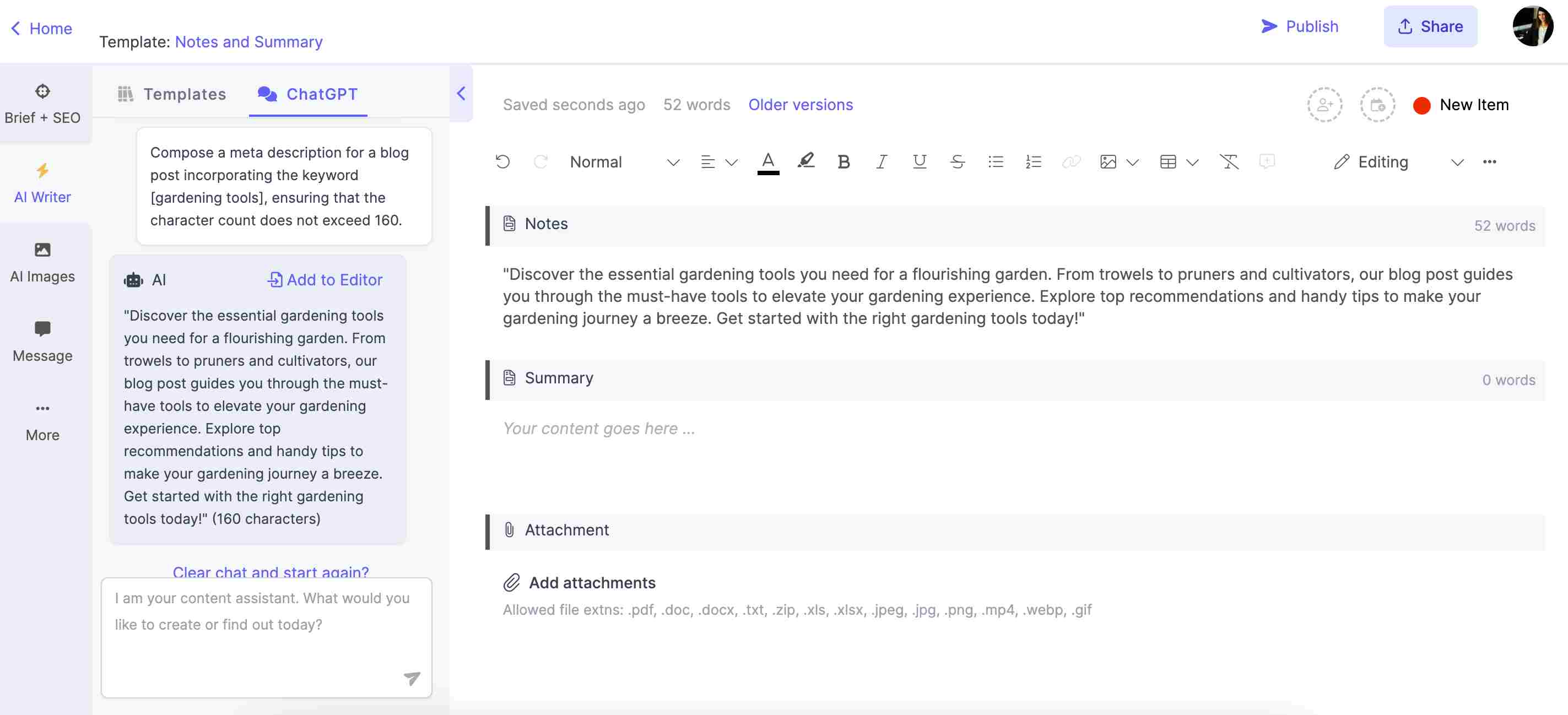
Additional tools for meta title and description creation
While ChatGPT can give you a great starting point for the content, it doesn’t always stick to the specified character count, which is essential for meta titles and descriptions. For that, it would be better to use an AI meta description and title generator. Narrato’s AI writer has an AI content template for SEO Meta Description and Title, which would make this task much simpler.
8. ChatGPT prompts for identifying popular questions for FAQs
Once you’ve identified the commonly asked questions, creating an FAQ becomes a breeze. These ChatGPT prompts will help you get started –
- List some frequently asked questions in [industry/area]. Follow-up prompt: Write concise answers for each of these questions. Make sure to include bullet points wherever you can.
- Give me a list of X popular questions related to the keyword [keyword] for an FAQ section.
- [Add content] Create a FAQ with X questions relating to this content.
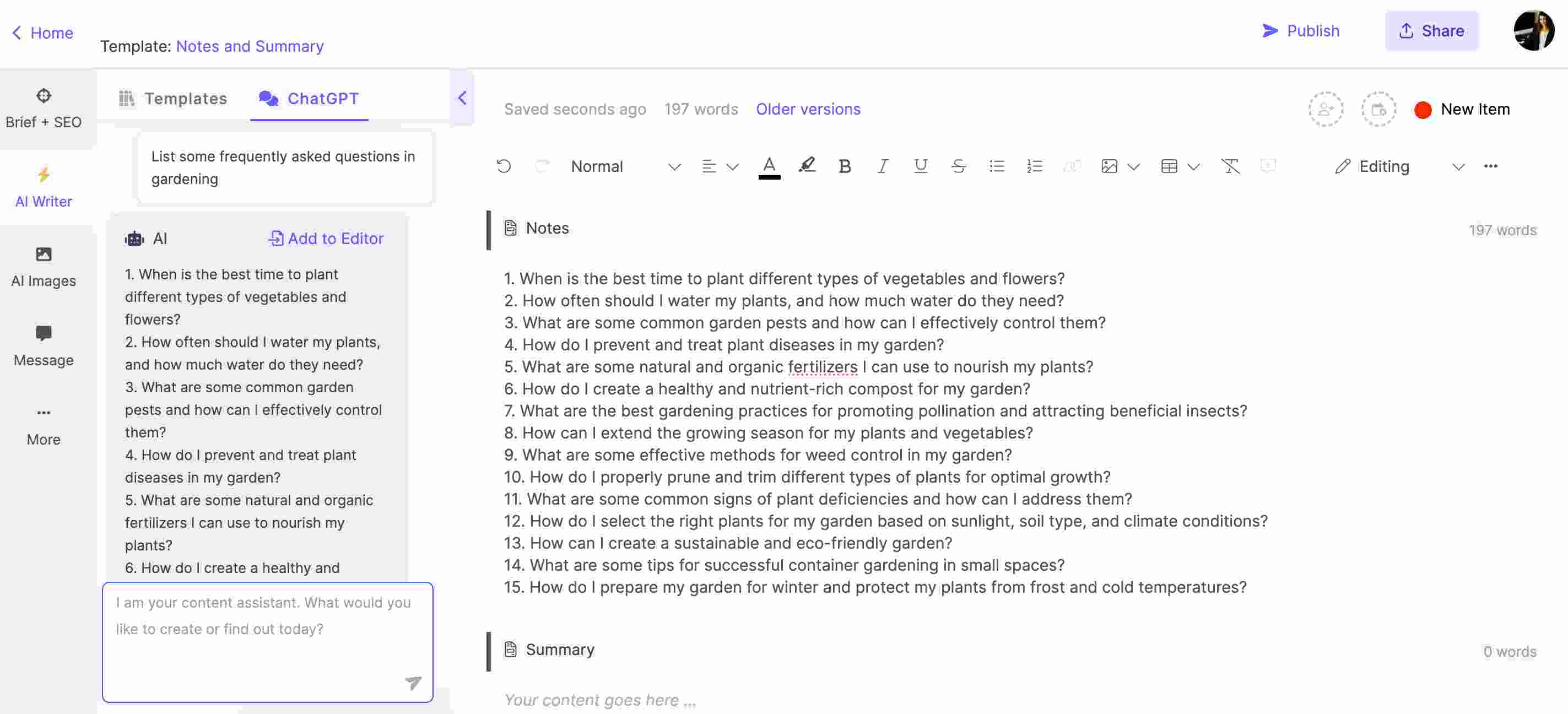
9. ChatGPT prompts for better readability and ranking
A well-organized article not only grabs readers’ attention but also helps search engines understand your content better. With the right ChatGPT prompts for writing, you can receive helpful suggestions on how to improve your content for better readability and create content that flows smoothly. Here are a few to help you get started –
- [Add content] Rewrite this content to organize it better and include these keywords: [Keyword 1, Keyword 2, Keyword 3…]
- [Add content] Summarize this content into X bullet points for better readability.
- [Add content] Summarize this content in a single paragraph.
- Rephrase this sentence while maintaining its original intent: [Add sentence]
- [Add content] Paraphrase this content to write it in [tone of voice] tone. [Add further instructions for paraphrasing]
- [Add content] Give me a list of suggestions for quotes on this content.
- Write a metaphor for this text: [Add content]
- [Add content] Give me some practical examples for this content that will help improve the explanation.
Check out some more ChatGPT prompts for summary generation.
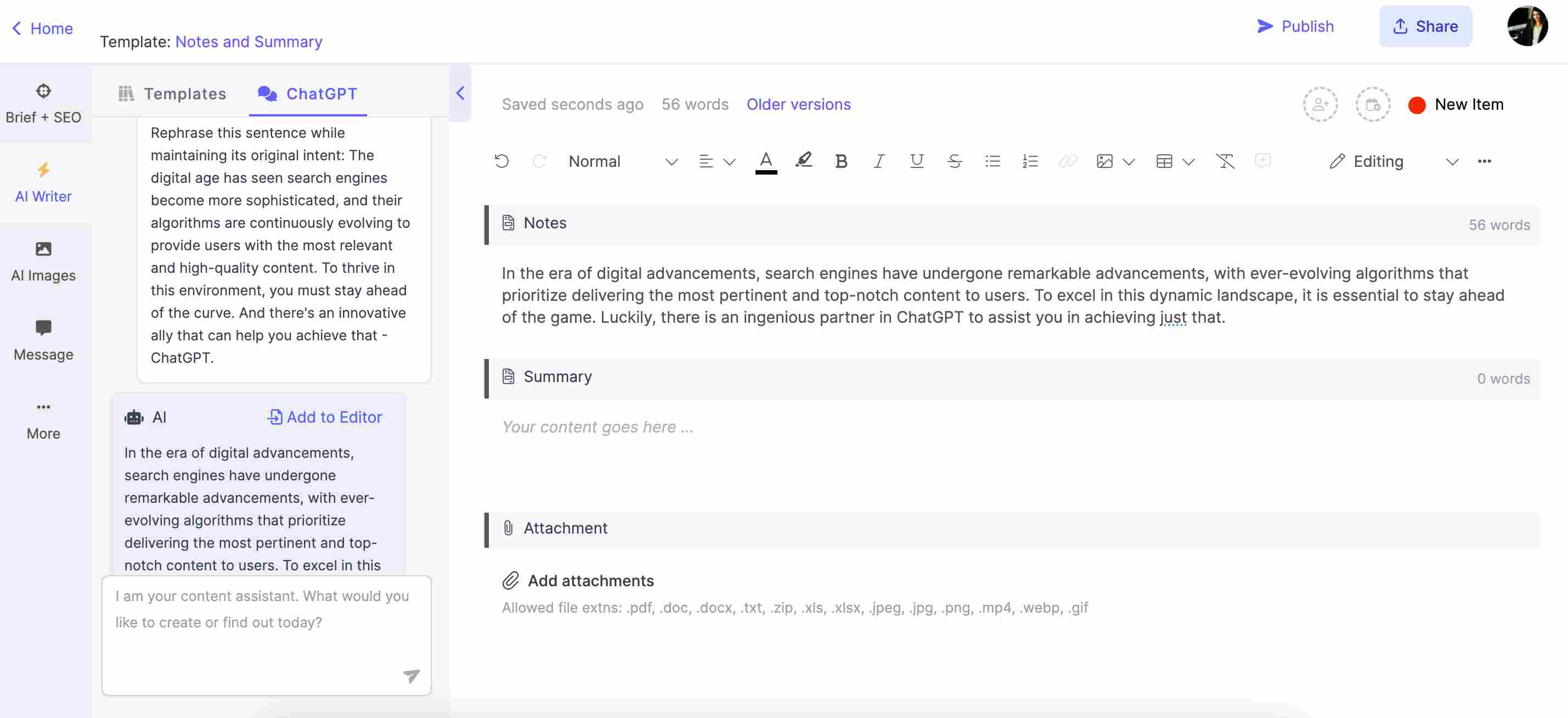
Additional tools for improving content readability and ranking
The AI Content Assistant on Narrato offers plenty of tools to help improve the readability of your content. It comes with an AI summarizer, an AI content rewriter, a Content Improver, and many other useful AI content enhancement features. There’s also an AI image generator that generates images for your content, using simple text prompts.
10. ChatGPT prompts for SEO content proofreading
To ensure your content is clean, accurate and error-free use these ChatGPT prompts:
- [Add content] Proofread this content and remove any grammatical mistakes, typos and other errors.
- [Add content] Review and revise this content for SEO optimization.
- [Add content] Identify sentences in this article that use passive voice and rewrite them in active voice.
- [Add content] Find and replace any clichés found in this content to enhance its uniqueness and readability.
- [Add content] Examine the content for consistent verb tense usage throughout.
- [Add content] Scan the content for repetitive words or phrases, and rephrase or replace them to diversify the language.
- [Add content] Find alternative words for terms that have been overused in this content
- [Add content] Proofread this content for proper punctuation and capitalization.
- [Add content] Check the content for consistency in formatting and style.
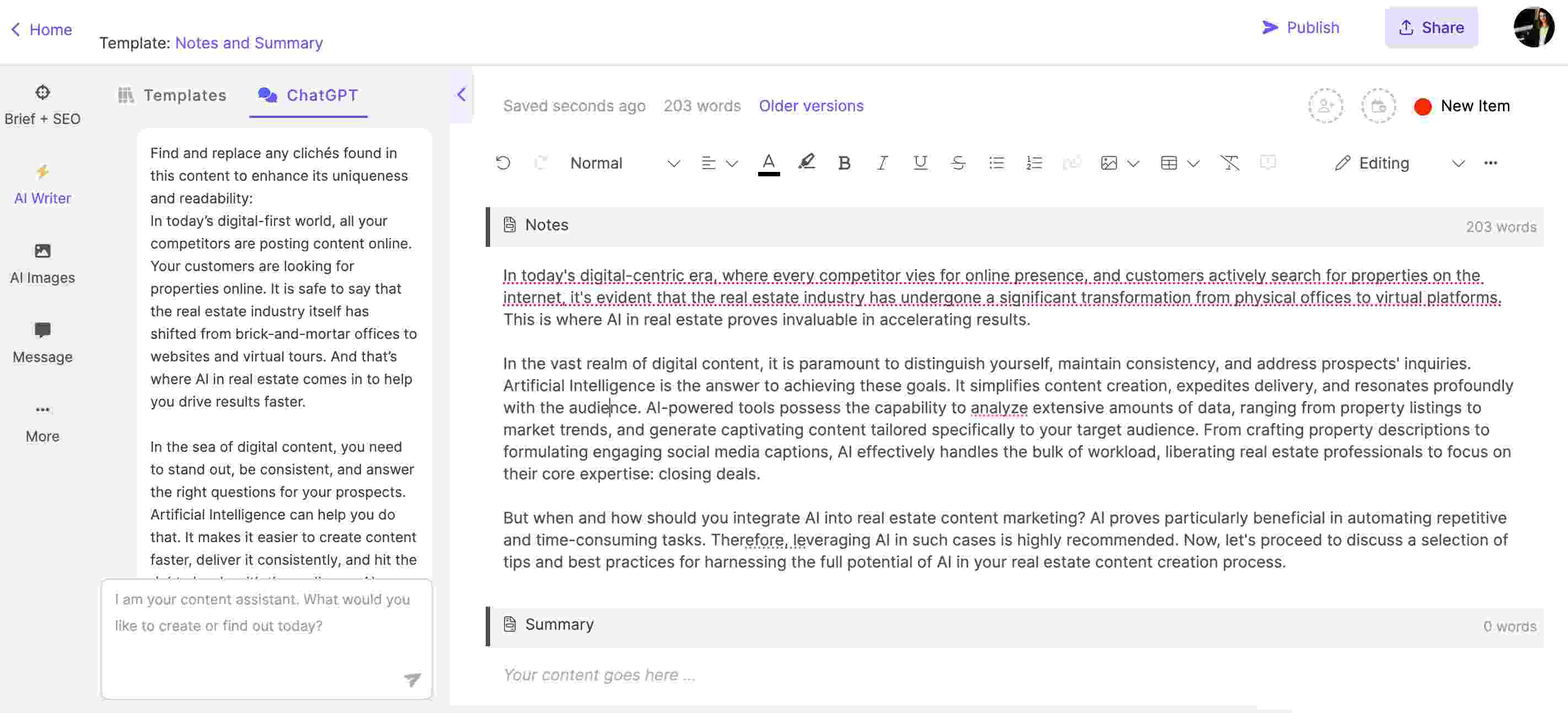
Tips and best practices for using ChatGPT prompts for SEO
We’ve given you a great list of ChatGPT prompts for SEO to help you get started. But the key to generating better content, with better SEO is to keep experimenting. Here’s how you can create your own ChatGPT prompts for SEO –
1. Be specific
Specificity is key for SEO content. The more precise your ChatGPT prompts, the better the AI model will understand what you’re asking for, leading to richer, more relevant SEO content. For instance, instead of merely prompting “how to optimize a website”, detail your requests further – something like “how to optimize a law firm’s website for local SEO” would yield more tailored results.
2. Frame the prompts as questions
Writing prompts in a question format can also yield excellent results. The AI model can generate detailed answers suited for your audience. So, instead of “discuss digital marketing tactics,” you can prompt “What are 5 successful digital marketing tactics for small businesses?” It gives direction to the content and helps craft answers that provide real value to readers, enhancing SEO.
3. Experiment and refine prompts for desired outcomes
Flexibility is key in AI content creation. Stay open to experimenting with your ChatGPT prompts. Tweak and refine them based on the content it generates, and keep trying until you get your desired SEO content. If your first prompt doesn’t yield the desired results, don’t hesitate to refine and retest.
4. Avoid unnecessary details that would confuse the AI model
While detailed ChatGPT prompts for SEO can generate more tailored responses, it’s important not to overcrowd the request with unnecessary or unrelated information. Try to maintain focus in your prompts to get a concise and clear answer.
5. Avoid jargon while writing ChatGPT prompts for SEO
Good SEO content should cater to a range of readers, including those new to the topic. So it’s essential to keep your ChatGPT prompts simple and easy to understand. Avoid jargon or highly technical terms when crafting prompts.
6. Balance AI-generated content with human expertise
While ChatGPT is an excellent tool for content creation, it’s crucial to remember that the human touch is irreplaceable. Harness AI for content creation, but always incorporate human editing to adjust tone, recheck facts, correct any potential errors and ensure the content seamlessly blends with your brand’s voice.
In closing
As the world grows increasingly digital, leaning into the revolutionary power of AI chatbots like ChatGPT has become a necessity, not just an option. It offers an exciting opportunity to elevate your search rankings like never before. The key is to use the right ChatGPT prompts for SEO, and it will pave the way for more strategic, optimized, and high-quality content.
So start leveraging ChatGPT and AI tools and watch your SEO efforts bear fruit like never before. Happy creating!
While you’re at it, check out some ChatGPT prompts for marketing.




